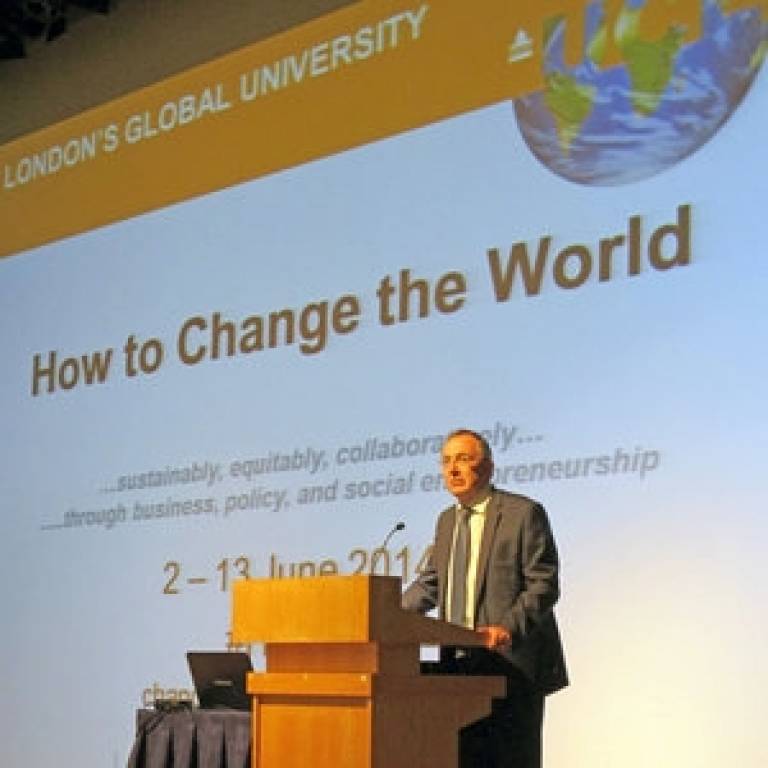'How to Change the World' programme launched by UCL Engineering
3 June 2014
New programme brings over 500 students together to tackle global challenges from the Red Cross, World Bank and UK Government Over two weeks, UCL Engineering students will tackle real challenges posed by global NGOs, Government agencies and departments, and come up with their own solutions, from creating resilient communities to predicting the future of urban transport in a new programme - How to Change the World.

Developed with UCL Science, Technology, Engineering and Public Policy (UCL STEaPP) as a pilot for the new UCL Integrated Engineering Programme, the course will draw together second year students from management, computer science, engineering and related disciplines.
On 2nd June the students will receive their challenges, including: Transport Futures (from Department for Transport), Really Smart Heating? and Valuing Materials (set by Department for Energy and Climate Change), Forecast-based Disaster Preparedness and Crowdsourcing for Humanitarian Work (set by the Red Cross), Safer Schools (set by the World Bank) and Resilient Cities (set by the Environment Agency).
Working in multidisciplinary groups, students will devise - and where possible, prototype - creative solutions to these challenge problems. Along the way, a programme of themed lectures, facilitated workshops and group studio time will provide training and spur creativity on how to change the world sustainably, equitably, and collaboratively. In addition, the programme will expose students to the skills required for mobilising change through business, public policy, and social change.
How to Change the World fits in with the wider UCL objective to improve student experience, by inspiring independent thinking, problem-solving and teamwork. The course mirrors the UCL strategy for impact on a global scale, and forming long-term partnerships in academia, industry and policy.
Professor Michael Arthur (UCL President & Provost)
Global leaders in policy, business and social enterprise, including Professor David MacKay, Chief Scientific Advisor to the Department for Energy and Climate Change, Dr Carole Easton, Chief Executive of the Young Women's Trust, and Professor Josh Silver from the Centre for Vision in the Developing World will share their working experience through lectures. These are designed to give students insight and inspiration for carrying out their challenges, while creating valuable, transferrable skills to tackle issues and communicate solutions.
With help and coaching from UCL and external staff, they will develop ideas, learn to work in teams, document their concepts through writing and video, and finally present their solutions to each other and judges. The winning team, chosen by popular vote, will be presented with its prize by Dame Nicola Brewer, UCL Vice Provost (International), at a gala award ceremony hosted by Dr Steve Cross (Head of Public Engagement) on 13th June.
How to Change the World will give students the chance to experience many features of the new Integrated Engineering curriculum: big challenges, free-form problem solving, multidisciplinary environments and team working. It draws on the resources of UCL STEaPP, a department which explores and enables links between engineering expertise and public decision-making, to give students experience of setting their work in context.
Professor Michael Arthur, UCL President & Provost, said: "How to Change the World fits in with the wider UCL objective to improve student experience, by inspiring independent thinking, problem-solving and teamwork. The course mirrors the UCL strategy for impact on a global scale, and forming long-term partnerships in academia, industry and policy."
Dr Jason Blackstock, Acting Head of Department for UCL STEaPP, said: "Over the next two weeks, How to Change the World is helping students develop the skills they need to tackle global, real-world challenges, such as food, water, energy, safety and transport. The course is been designed to provide students with an understanding of the wide range of social, business and policy contexts in which their engineering skills can be deployed to make the world a better place."
Dr John Mitchell, Director of the UCL Integrated Engineering Programme, said: "This is an exciting opportunity for our students to see how their technical skills can make changes in the lives of people worldwide - ultimately, engineering is about human wellbeing. We are delighted to give them the chance to work with Government and major global organisations, and contribute to real and pressing global challenges."
Videos and updates from the students studying How to Change the World will be available from 9th June.
 Close
Close

